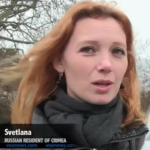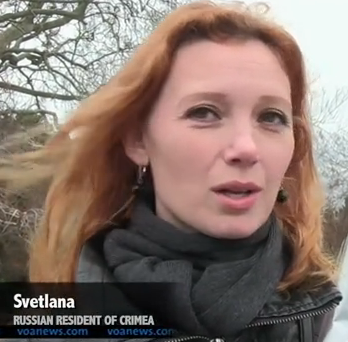BBG Watch Commentary

Voice of America (VOA) upper management is still unable to organize prompt and adequate news coverage and insure that VOA websites are promptly updated with comprehensive news reports on U.S., Russia, Ukraine and other major news developments, but individual VOA correspondents — those who have not yet left in total frustration and in opposition to bullying by senior executives — continue to provide outstanding news reporting. Posting of these reports is often delayed by poor planning and poor management of personnel and VOA websites, but eventually they do get posted online.
Elizabeth Arrott, who speaks Russian and has extensive experience covering news in Russia, former Soviet republics and other parts of Eurasia, as well as in the Middle East, is one of the great VOA reporters still trying to do their jobs despite many administrative obstacles and bad leadership at the top of the organization.
VOA senior managers have largely ignored Ukraine news story in their news coverage plans for many weeks, even when it became a major crisis.
As late as a few weeks ago, VOA executives were still more interested in covering Justin Bieber’s drunk driving escapades than in covering news in Ukraine.
For many weeks, they made no arrangements to have a VOA English news correspondent on the ground in Kyiv.
Arrott was finally sent to Ukraine not too long ago and has filed some excellent reports.
As historical background to this this report we would add that Crimea was not Russian-ruled or had majority Russian population for many centuries, as it does now.
Crimea was taken away by Russia from the Ottoman Empire, the Tatars and other local inhabitants only in the 18th and 19th centuries. It was then administratively transferred to Ukraine by Khrushchev in 1954.
One rarely hears from Tatars in Western media reports from Ukraine. For that reason Arrott’s report is especially interesting and timely.
It should be noted that in 1944, the entire population of the Crimean Tatars was forcibly deported to Central Asia by Joseph Stalin as a form of collective punishment, on the grounds that they had collaborated with the Nazi occupation forces. An estimated 46% of the deportees died from hunger and disease. Crimea was effectively ethnically cleansed.
Some of the Tatars have now returned to Crimea, but they are no longer the majority in their former land — ethnic Russians are.
Another historical fact that helps to understand the current crisis is a man-made famine in Ukraine in 1932 and 1933 that killed up to 7.5 million Ukrainians. The famine is blamed on the Soviet government in Moscow and Kyiv.
Also worth noting is that Crimea has the highest proportion of Muslims in Ukraine, most of them Tatars.
Elizabeth Arrott is most likely correct in her observations — chances are good that the map of Europe is again being redrawn in the Kremlin.
###
On The Scene: Elizabeth Arrott in Yalta, Crimea
Elizabeth Arrott, Sebastian Meyer
March 10, 2014
YALTA, CRIMEA — The fight over Crimea’s future has pitted Russia against Ukraine. But loyalties are not so clear cut on the multi-ethnic peninsula.
In Yalta, a seaside resort on the Crimean coast where Allied leaders began redrawing the map of Europe near the end of World War II, the map may be about to change again.
Pro-Russian forces have taken control across Crimea and on March 16, a referendum could help move the Ukrainian region to full Russian rule.
But despite being a region on the brink, for the most part, tensions slid away for a day along Yalta’s promenade. Families strolled along the shore, enjoying the sea, and each other. Further down, a pro-Russian rally gathered under the watchful eye of Lenin, reflecting the sentiment of many in Crimea’s ethnic Russian majority.
Svetlana is a Russian citizen. Her husband, Rustem, is Ukrainian – a Crimean Tatar. She moved to Ukraine three years ago and believes Moscow’s intervention in the name of protecting Russians is false.
“Nobody does any harm to Russian people here. I know it myself,” she said. “Everything is very peaceful here. Everything used to be very peaceful until Putin came.”
Rustem adds that the only harm is to the region’s non-Russians. His comments attract a few angry onlookers.
“The rights of Crimean Tatars and the rights of Ukrainian people are being violated. I am appealing to you, please protect us. Have a look. This is exactly what I am talking about, ” Rustem said, adding that he is ready to fight for what is dear to him.
“We are waiting to see what happens. If it changes, we will protect our motherland.”
It is that concept of motherland that is at the heart of this conflict. For centuries, Russians claimed Crimea as their own. It has inspired generations of poets and playwrights, Chekov among them and Moscow is poised to claim it again.
